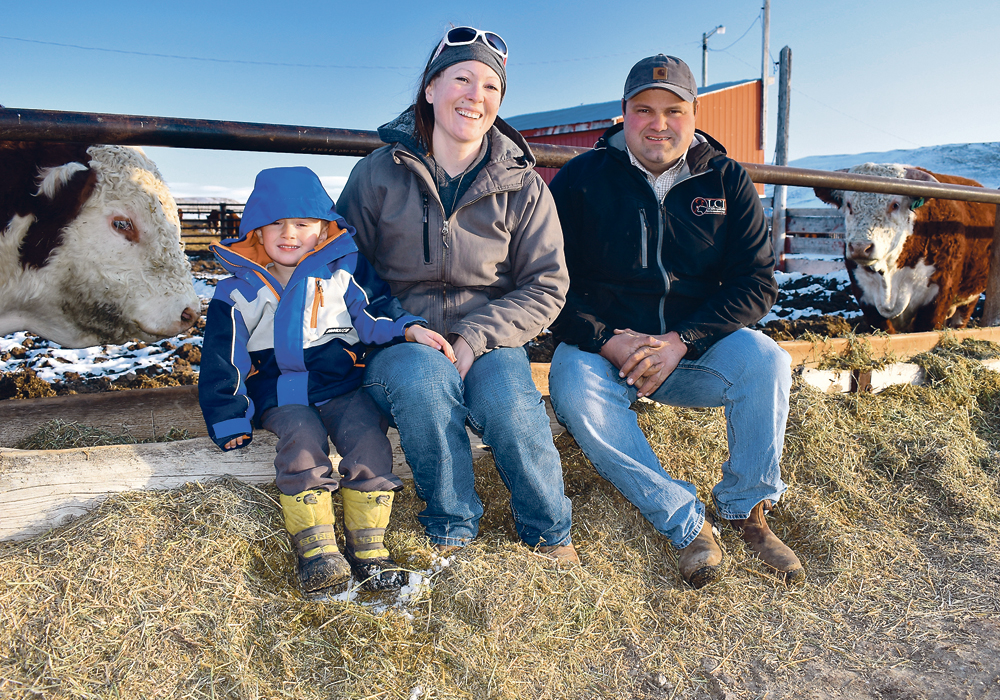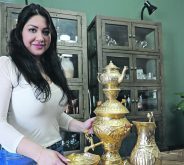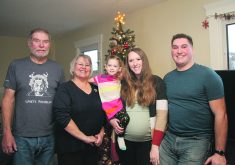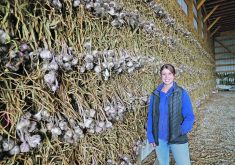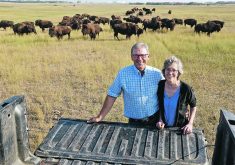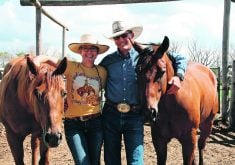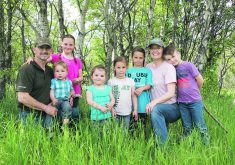On the Farm: Veronica and and Brad Doenz operate LCI Doenz Ranches and raise two sons in southern Alberta
WARNER, Alta. — Veronica Doenz wears a T-shirt that gives an immediate clue about her busy life. Chasing Cows and Kids, it reads.
She and her husband, Brad, have two young sons and 300 cows so they both do a lot of each activity. Jordy, 7, is in Grade 2 at the Warner school and Branson, 4, is another bundle of energy.
Together they operate LCI Doenz Ranches just east of this southern Alberta town and last year received a Century Farm and Ranch award from the provincial government.
The LCI acronym related to Chris and his two sons, Irvine and Leo. Chris is Brad’s great-grandfather and Leo is his grandfather. The cattle business has been a mainstay for the family, which held its 46th annual production sale at the ranch in early December selling purebred Hereford and Angus cattle. Brad described sale results this year as decent.
Read Also

Nutritious pork packed with vitamins, essential minerals
Recipes for pork
“We started with Herefords and then we added the Angus in 2001,” he said. “We’re about half and half now in numbers.”
They sell about 50 Angus bulls and 25 Hereford bulls each year and grow all their own feed on 2,500 acres, 350 of them irrigated to produce hay and barley silage, plus some fall grazing. They also lease additional land near Coutts, Alta.
Brad and Veronica, a nurse, met through mutual friends and married about 10 years ago. Brad was raised on the ranch and Veronica is also a farm girl originally from Mortlach, Sask.
“I always say I’ve been groomed to the position,” she said, noting her background in both farming and cattle production.
“I find purebred (production) is something you can be passionate about. Yes, there’s passion behind raising a commercial animal but there’s passion also …when you’re raising a purebred animal that’s going to be a service to someone else. And when you’re having a sale, you’re putting your best out there.
“Now that we have kids, it’s more than that too. I have a friend that always tells me right now, when your kids are young, you’re just one foot in front of the other … but in the end… it’s that you’re trying to leave something for your kids to have the option of doing when they get older.”
Given the costs involved in entering the farm and ranch business, it seems almost impossible to start from scratch, said Veronica, so building an operation that the boys might one day run provides an extra spark to their work.
Brad also likes the lessons ranch life can teach.
“It shows them work value. I feel that the economy and other things don’t provide that anymore. There’s nothing like taking care of animals and seeing them from a baby to selling in a bull sale to going to see the customer to see how it worked.”
He and Veronica have put in many cold February days and miserable nights in the calving pen and barn, but watching the calves grow and then seeing customer satisfaction with the animals they sell is a source of pride.
“We know their needs and they know how we do it,” said Brad.
Veronica added that customer retention means everything.
They carry out their own artificial insemination, choosing genetics to produce desirable outcomes. For Angus, the goal is moderate birth weights and good growth rates, high weaning and yearling weights, plus good feet and udders.
On the Hereford side, “we want good weaning weights and yearling weights and we want red neck and red eye, lots of pigment and good hair. And lots of muscle,” said Brad. “Performance is key but keeping the udders clean and a good structured foot.”
The couple appreciate the variety of learning and knowledge involved in cattle production.
“In farming we’re always dealing with science and chemistry and biology and math every day, your rations and what you’re feeding and cost of production,” Veronica said.

That said, it’s hard not to take criticism personally when it comes to modern-day agriculture, she added, particularly when fertilizer prices are up, there’s a carbon tax to pay and the cattle market is down.
“It’s one thing to take (criticism) as a business, but you take it so personal when you’re a farmer or rancher. When it comes to all these things of ethically raised beef and how you raise your crops and what chemicals you use or farming practices … we take that pretty personal. I think every farmer and rancher will take it personally because there’s not one person who’s not trying to do their best in their business. We’re all trying to produce a product for people to eat, for people to use, to sustain.”
She and Brad talk about whether they will encourage the boys to take over the operation one day. Some days, when things haven’t gone well, the answer is no.’
“I don’t want my kids to struggle like we did,” said Brad.
But on other days, they see the advantages.
“I’m so grateful that I can give my kids an opportunity to see things that a lot of kids don’t have the opportunity to see,” Veronica said.
“And there’s the joy of knowing that you can build something…. There are financial hardships sometimes with it, but if you don’t like something, you don’t have anyone else to answer to. You can change it.”
Brad noted the succession process of taking over the operation was sometimes rocky but being in charge of their own destiny is valuable.
“We’re working for something of our own and a lot of people can’t say they do that.”




